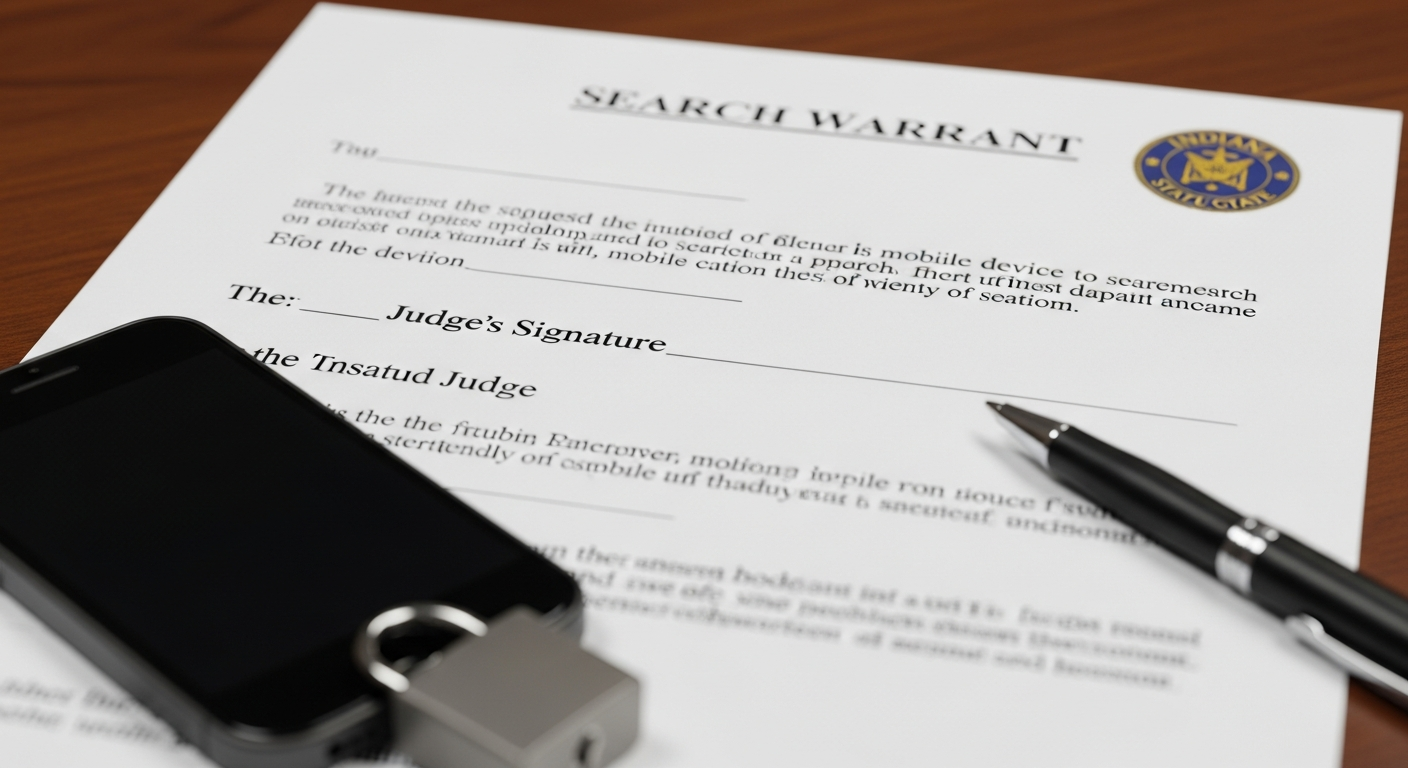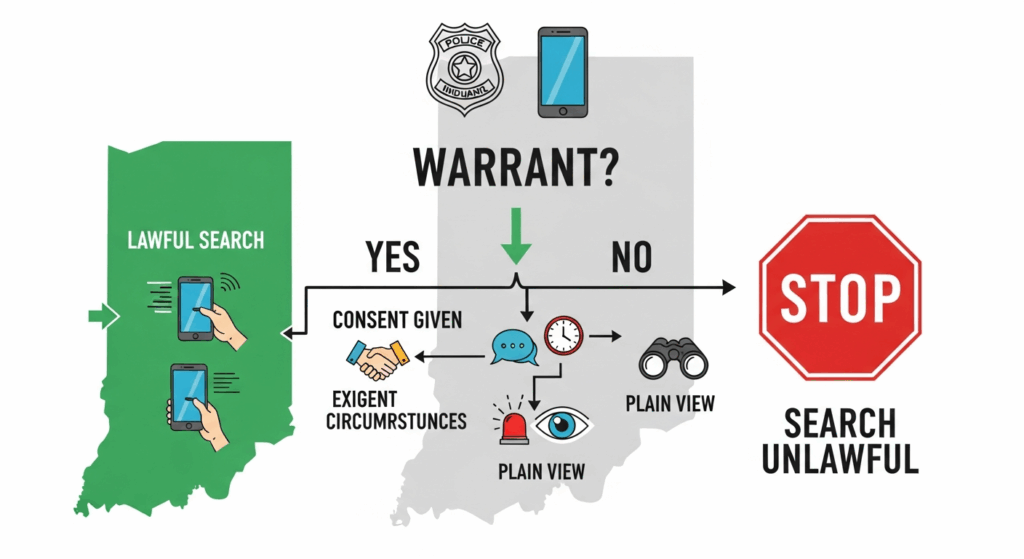
Imagine this scenario: you are pulled over by police in Indiana. The officer asks if they can look through your phone. Can they legally force you to unlock it or search its contents without first obtaining a warrant?
Many people ask that exact question, “Can police search my phone without a warrant in Indiana?” The answer is not always straightforward. At Eskew Law, we believe that understanding your rights in such situations is a crucial first step toward vigilant and effective defense.
Chris Eskew, of Eskew Law and a dedicated criminal defense attorney, often reminds clients: “Your digital privacy is protected under the Constitution, but there are exceptions and evolving case law that change the playing field.”
Let’s examine what the law says in Indiana, how federal decisions affect state practice, and where your best protections lie.
The Constitutional Foundation: Fourth Amendment and Riley Decision
The Fourth Amendment to the U.S. Constitution protects individuals against unreasonable searches and seizures. In the modern age of smartphones, courts have struggled to adapt old principles to new technologies.
In Riley v. California (2014), the U.S. Supreme Court held that police generally must obtain a warrant before searching the digital contents of a cell phone seized during an arrest. That landmark decision recognized the vast troves of private data contained on modern phones.
Because Riley is a federal constitutional rule, it applies in Indiana unless state courts interpret the Indiana Constitution more restrictively (i.e., giving greater protection). In practice, Indiana courts have aligned mainly with Riley in recognizing strong privacy interests in digital content.
The Default Rule in Indiana: Warrant Required
Under Indiana law and prevailing practice, the starting point is that police cannot search your phone’s contents without a valid warrant or a lawful exception.
- They may seize the phone itself as part of an arrest, but that is not the same as opening and rummaging through it without judicial oversight.
- Any search of messages, photos, apps, call logs, or stored data typically requires a warrant supported by probable cause.
- If police conduct a search without a warrant and without satisfying a recognized exception, the evidence obtained could be suppressed under the exclusionary rule meaning the court cannot admit it against you.
Chris Eskew emphasizes, “We do not concede that police have free rein over your phone. If they violate proper procedure, we will challenge that evidence at every stage.”
Recognized Exceptions: When Police Might Search Without a Warrant

Although the warrant rule is robust, Indiana and federal law acknowledge several exceptions. Knowing them is essential because they often form the battleground in criminal defense litigation.
Consent
If you voluntarily consent to a phone search, then police do not need a warrant. But consent must be knowing, voluntary, and uncoerced. If you feel pressured, your attorney may be able argue the consent was invalid but it is a difficult argument.
Exigent Circumstances
In urgent situations, say, to prevent imminent harm, preserve evidence, or stop a suspect from deleting incriminating data, police may argue exigent circumstances justify a warrantless search. The courts will closely scrutinize whether the urgency truly left no time to obtain judicial approval.
Plain View Doctrine / Open Display
If the phone is unlocked and the officer sees incriminating evidence plainly visible (for example, an illegal image on screen), they may seize or use what they observe. However, this exception is narrow.
Search Incident to Arrest: Limited Scope
Under traditional “search incident to arrest” rules, police can search the immediate vicinity of a person when making an arrest. But Riley limits the reach of this doctrine with respect to phones: they can take the device into custody but cannot explore its contents without a warrant (unless another exception applies).
Location Data and Third-Party Doctrine: A Special Case
There is a distinct branch of law that addresses historical cell-site location information (CSLI), that is, the records held by your phone company about which cell towers your phone connected to. Under the third-party doctrine, individuals have been said to lose a reasonable expectation of privacy in data voluntarily shared with third parties.
In Zanders v. State (2017), the Indiana Supreme Court held that a defendant had no reasonable expectation of privacy in historical CSLI obtained from his phone company without a warrant. That means police may access your past location records from the provider in some cases without a direct warrant under Indiana precedent.
However, in Carpenter v. United States (2018), the U.S. Supreme Court held that the government must generally obtain a warrant to access historical location data under the Fourth Amendment. The interaction between Carpenter and state law is a developing area; defense attorneys often argue that state practice must evolve to respect Carpenter’s reasoning.
At Eskew Law, we understand that for a search to be legal it must comply with the Federal Law under the 4th Amendment and the Indiana Constitution, Article 1 Section 11.
Where Defense Strategy Enters: Suppression Motions and Challenges
If law enforcement searches a phone in violation of constitutional rules, your defense attorney can file a motion to suppress the evidence. Suppression means the court may exclude improperly obtained evidence from trial, which can significantly weaken the prosecution’s case.
Key questions raised in suppression hearings include:
- Did the police have a valid warrant with proper particularity?
- If no warrant, did a recognized exception apply (consent, exigency, plain view)?
- Were those exceptions appropriately applied, or did police overstep?
- Should modern decisions like Carpenter influence how courts treat CSLI and digital evidence in Indiana?
We also examine whether the good-faith exception might allow otherwise invalid searches if officers reasonably relied on a defective warrant.
Chris Eskew often prepares robust briefings and arguments to highlight overreaches by law enforcement in digital evidence seizures.
Practical Tips: What You Should Do If an Officer Asks to Search Your Phone
- Do not volunteer your passcode or unlock your phone. Your silence or refusal cannot be held against you in court under the privilege against self-incrimination.
- Politely decline or say, “I do not consent to a search of my phone.” You can still be polite but assert your right.
- Ask whether the officer has a warrant. If they do, demand to see it.
- Do not resist physically or allow unlawful force. Instead, comply with lawful orders and preserve the issue for legal challenge with your attorney.
- Contact a trusted attorney immediately. Time is critical to preserve challenges and protect your rights.
Why Choose Eskew Law for Your Defense?
Our boutique firm is built on the belief that no one should feel powerless when facing serious criminal allegations. We devote ourselves entirely to criminal defense, DUI defense, and related matters.
At Eskew Law, we combine:
- Knowledge of Indiana and federal constitutional law
- Hands-on experience challenging digital evidence practices
- Personalized attention and fearless advocacy in court
If you believe your phone was unlawfully searched or seized, we invite you to contact us for a free case evaluation. Our team will analyze whether your rights were violated and explore motions to exclude evidence or negotiate on your behalf.
Understanding and Protecting Your Rights
Yes, police in Indiana generally must obtain a warrant to search the contents of your phone, even after arrest, thanks to Riley. But exceptions, state precedents like Zanders, and evolving law in response to Carpenter may complicate matters. The stakes are high: your personal data may reveal your movements, relationships, and intentions.
When the government attempts to invade your digital life without proper justification, your defense is crucial. Whether you are in Indianapolis, elsewhere in Indiana, or just concerned about the legality of a search, Eskew Law is prepared to stand with you. Let us protect your rights and fight to ensure you are not convicted on evidence obtained unlawfully.
If you want to explore whether your phone was correctly searched, or if evidence from your device is admissible, call Eskew Law today for guidance you can trust.








